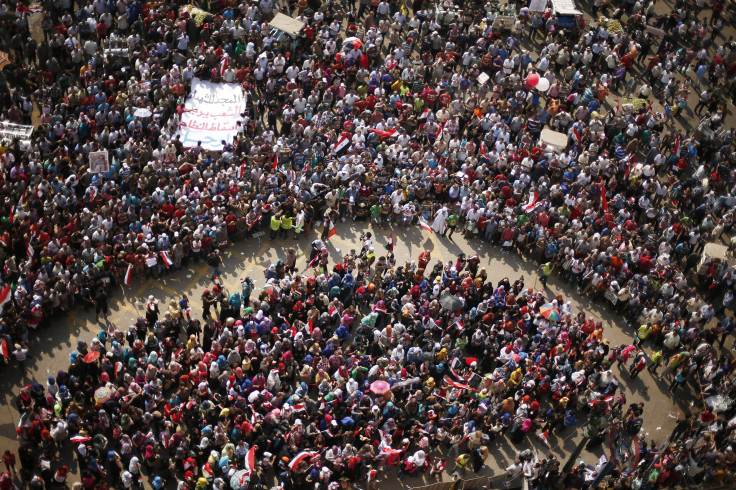Egypt Sees Biggest Protest In More Than Two Years, Demanding President Morsi’s Resignation

Protests across Egypt, demanding the resignation of President Mohamed Morsi, exploded on Sunday to become the biggest mass movement the North African country has seen since 2011, which overthrew former President Hosni Mubarak, as hundreds of thousands of people took to the streets nationwide, and marched on the presidential palace in Cairo.
The headquarters of Morsi’s party, the Muslim Brotherhood, came under attack from protesters, who pelted stones and firebombs at the building, leading to a brief fire near its entrance.
Five protesters were killed in clashes with Brotherhood supporters near the headquarters, Associated Press reported, citing activists. Five more protesters were killed on Sunday in clashes in southern Egypt, including two outside offices of the Brotherhood’s Freedom and Justice Party in the cities of Beni Suef and Fayoum, the report added.
“This revolution is not over yet,” Mohamed ElBaradei, a Nobel peace laureate and former U.N. diplomat, and a prominent opposition leader, told the Arab daily, Al-Hayat, last week.
Morsi has declared that he will not step down, while fears grow that the clashes between his opponents and supporters could escalate into civil war. Presidential spokesman Ihab Fahmi urged Egyptians to “unite and listen to the sound of wisdom,” adding that “political diversity necessitates on all parties to abide by the democratic process.”
He reiterated that the president was open to a “real and serious national dialogue.”
Protesters have vowed that they will not back down until their demand is met, and have called for labor strikes starting on Monday. Morsi took charge as president on June 30, 2012, after a narrow win in the country's first presidential election following Mubarak's ouster.
However, his first year in office was marked by a deep divide, after a series of controversial decisions, as Morsi, and his Brotherhood party, failed to gain the support of his liberal and secular opponents, led by the National Salvation Front.
Last month, Morsi appointed Islamists in charge of 13 of Egypt’s 27 governorships, reigniting the fears of his secular opposition.
Even Egyptians without affiliation to any particular political party are taking part in the protests to express anger over Morsi’s political and economic policies, which have failed to produce significant results or stabilize the economy, BBC reported. Egypt’s unemployment has spiked to more than 13 percent from 9 percent in 2010 -- before the 2011 revolution.
Egypt is yet to strike an agreement with the International Monetary Fund, or IMF, for a loan of $4.8 billion, which analysts say is critical for the survival of the cash-strapped country. The IMF wants Egypt to cut back on its spending on subsidies, but amid strong anti-government sentiments, Morsi’s administration is not in a position to introduce austerity measures, according to a Dow Jones report.
Egypt’s wealthy allies in the Middle East, such as Qatar and Saudi Arabia, have been pumping unconditional cash into Egypt’s economy to help the nation of 80 million people to import food and fuel. However, such measures, in the absence of internal reforms, continue to delay Egypt’s fiscal consolidation and economic stability.
© Copyright IBTimes 2024. All rights reserved.












